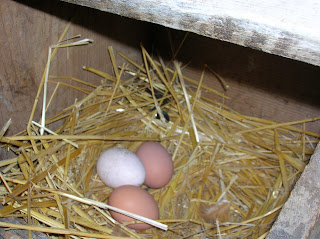Today's eggs - can you tell which one is ceramic?
Rather than hunting for eggs each day, a ceramic egg teaches chickens where to lay.
A recent NY Times op-ed titled "Math Lessons for Locavores" seems to completely miss the point of locavorism. Most of the article is focused on the view that local eating is energy taxing on our earth and land. What the author fails to realize is that individuals who choose local foods do so for many reasons other than energy savings. Look at the Love Local Food blog description...inspiring people to choose locally produced foods to keep money in our local economy, help local food producers (i.e. create local jobs), and impact our health (when is the last time you saw Twinkies at the farmers' market, and who needs dessert when you've got great tasting produce?)
And, don't forget, eating locally spreads the risk of food safety. What if the individuals in the 20+ states affected were buying eggs from producers in their own states, or community, rather than from two farms in Iowa? (I know, the big industry folks say enough eggs couldn't be produced by small farms, I've heard the arguments.) Sure, they could get food poisoning from eggs from a local producer, but a much smaller number of individuals would be affected because all the eggs would not be coming from one or two locations. So, add smaller outbreaks of food borne illness to the list of reasons to eat locally.
Chicken Update: When reading about the problems with eggs, I learned chickens ingest rodent droppings, which causes them to lay eggs with salmonella inside the egg. Monday I went out to feed our ladies and alas, I found rodent droppings in my bag of feed. So, this food safety inspector and egg production employee purchased a mouse trap. Nope, no salmonella in my eggs, thank you very much (I caught him). How's that for control over the food system?

Experienced poultry keepers tell me you probably do have salmonella in your eggs... you always have to assume so, and act accordingly. Even if you trap mice near the feed (and galvanized trash cans are cheap and far more rodent- and moisture-proof than bags, sez the voice of learned-the-hard-way) chickens will gleefully eat entire mice out in the yard (as will ducks, which is why I violate city ordinance by using mechanical instead of chemical rodent control). Lizards too, and anything else they can catch. If they don't have salmonella now, they can pick it up at any time down the road, and not show symptoms.
ReplyDeleteThe important question isn't if, it's how much. And for how long... the longer an egg sits in the production line, the more the salmonella multiplies. So the same amount of infection is no problem with a backyard bird whose eggs you eat promptly (even raw; a healthy person can cope with tiny amounts of salmonella as a matter of course), or with older eggs you cook thoroughly (which can kill even a raging salmonella infection dead), but it's suddenly a problem with older eggs (which supermarket eggs invariably are) that you don't cook thoroughly and/or cross-contaminate with something else that doesn't get cooked.
The biggest problem, as I see it, is that the egg industry has gone to such great lengths to provide us with perfect, uniform, snow-white eggs that we think of them as something pristine and lab-sterile. Who washes their hands (or kitchen equipment) after contact with an unbroken eggshell, after all? It's clean, isn't it?
And we're told they're "fresh"... typically farm eggs get sold with a "Laid on or after" date (mine do), not with a "use-by" date that doesn't actually tell anyone how old the eggs are at purchase.
Thanks for the informative post Karen...so that should have been "not much" instead of "no" salmonella in my eggs! I have never been one for raw anything...including dipping my toast in the yolk...except for cookie dough, I love cookie dough and may have to find an eggless alternative that I can eat raw.
ReplyDeleteLove the "laid on or after" date - I haven't seen that on the eggs I purchased at the farm.
Keep your informed, educated and insightful comments coming!